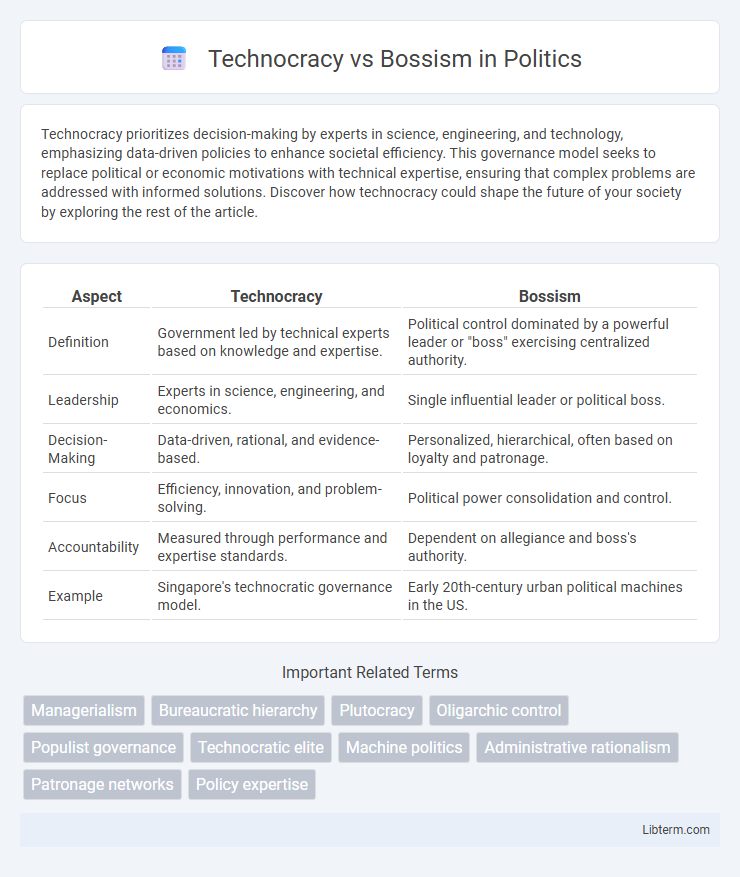Technocracy prioritizes decision-making by experts in science, engineering, and technology, emphasizing data-driven policies to enhance societal efficiency. This governance model seeks to replace political or economic motivations with technical expertise, ensuring that complex problems are addressed with informed solutions. Discover how technocracy could shape the future of your society by exploring the rest of the article.
Table of Comparison
| Aspect | Technocracy | Bossism |
|---|---|---|
| Definition | Government led by technical experts based on knowledge and expertise. | Political control dominated by a powerful leader or "boss" exercising centralized authority. |
| Leadership | Experts in science, engineering, and economics. | Single influential leader or political boss. |
| Decision-Making | Data-driven, rational, and evidence-based. | Personalized, hierarchical, often based on loyalty and patronage. |
| Focus | Efficiency, innovation, and problem-solving. | Political power consolidation and control. |
| Accountability | Measured through performance and expertise standards. | Dependent on allegiance and boss's authority. |
| Example | Singapore's technocratic governance model. | Early 20th-century urban political machines in the US. |
Understanding Technocracy: Definition and Principles
Technocracy is a system of governance where decision-makers are selected based on their expertise in science, technology, and specialized knowledge rather than political affiliations or popular vote. It emphasizes efficiency, rationality, and the application of scientific principles to policymaking, aiming to optimize societal outcomes through data-driven and evidence-based strategies. This contrasts with Bossism, where power is centralized among political bosses who rely on patronage, personal loyalty, and often manipulation rather than technical expertise.
Bossism Explained: Origins and Characteristics
Bossism originated in the late 19th and early 20th centuries as a form of political control dominated by influential leaders, or "bosses," who exercised power through patronage and loyalty networks. Characterized by centralized authority, manipulation of votes, and control over local government decisions, bossism often thrived in urban political machines. Unlike technocracy, which emphasizes expertise and evidence-based governance, bossism relies on personal influence and political favors to maintain control.
Key Differences Between Technocracy and Bossism
Technocracy emphasizes governance by experts and specialists who base decisions on technical knowledge and data-driven analysis, ensuring policies are informed by scientific principles. Bossism centers around a powerful leader or boss who wields authority through political influence, patronage networks, and personal control rather than expertise. The key difference lies in technocracy's reliance on expertise and rational decision-making contrasted with bossism's dependence on hierarchical authority and often populist leadership.
Historical Evolution of Technocratic Governance
Technocratic governance emerged prominently in the early 20th century as industrialization and complex economies demanded specialized knowledge and expertise for efficient decision-making. Contrasting bossism, which relies on personal influence and centralized control typical of political machines in urban America during the late 19th and early 20th centuries, technocracy emphasizes meritocratic leadership through scientific management and policy rationality. Key historical milestones include the rise of technocracies during the New Deal era in the United States and post-World War II reconstruction in Europe, where expert bureaucracies played critical roles in shaping economic and social policies.
The Rise and Impact of Bossism in Politics
Bossism emerged in the late 19th and early 20th centuries as political leaders, known as political bosses, capitalized on urbanization and immigrant populations to build powerful patronage networks. Unlike technocracy, which relies on expertise and data-driven decision-making, bossism largely depends on personal loyalty, political favors, and often corrupt practices to control local political machines. The impact of bossism includes entrenched corruption, weakened democratic institutions, and the manipulation of electoral outcomes, contrasting sharply with the meritocratic principles that underpin technocratic governance.
Advantages of Technocratic Leadership
Technocratic leadership prioritizes expertise and evidence-based decision-making, leading to more efficient and rational policy implementation compared to Bossism. This approach reduces the influence of personal biases and political favoritism, fostering long-term stability and professional governance. By leveraging specialized knowledge, technocratic leaders enhance innovation and adaptability in complex administrative systems.
Drawbacks of Bossism in Modern Society
Bossism in modern society often leads to centralized power that undermines democratic decision-making, causing inefficiency and corruption. The concentration of authority in a single leader or small group can stifle innovation and employee autonomy, reducing overall organizational performance. Public trust erodes as favoritism and lack of accountability become prevalent, highlighting the need for more transparent and expertise-driven governance models like technocracy.
Case Studies: Technocracy vs Bossism in Action
Case studies of Technocracy vs Bossism reveal distinct governance approaches with varying impacts on policy implementation and public trust. In Chicago under Bossism, political machines controlled decisions through patronage, often leading to corruption and inefficiency, whereas Singapore's technocratic model emphasized expertise and data-driven policies, resulting in rapid economic growth and effective public administration. These examples highlight how technocratic governance can promote transparency and meritocracy, contrasting sharply with the centralized authority and nepotism characteristic of bossist regimes.
Challenges and Criticisms of Both Systems
Technocracy faces challenges such as potential technocratic elitism, where decision-making may exclude public participation and prioritize technical expertise over democratic values. Bossism encounters criticism for centralized power leading to authoritarianism, corruption, and suppression of dissent within organizations or governments. Both systems struggle with balancing efficiency against accountability and transparency in governance.
Prospects for Future Governance: Technocracy or Bossism?
Technocracy, emphasizing expertise-driven decision-making, promises efficient, data-based governance that can address complex societal challenges with precision. Bossism, characterized by centralized authority and personal loyalty, risks inefficiency and corruption but may offer swift, decisive leadership in crisis situations. Future governance likely favors technocracy as global issues demand specialized knowledge and transparent policies supported by technological innovation.
Technocracy Infographic

 libterm.com
libterm.com